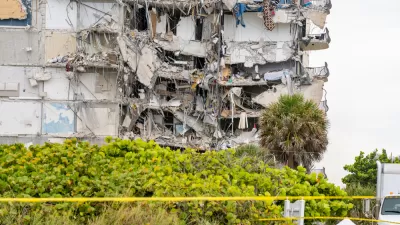A coastal geologist urges state leaders and residents to start planning for 'managed retreat' away from the coastal communities most vulnerable to sea level rise.

While climate change may not be directly related to the partial collapse in June of a condo building in Surfside, Florida, "the collapse has shone a spotlight on Florida’s unique vulnerabilities to climate change and raised questions about whether the state’s coastal infrastructure is equipped to handle the flooding that comes with sea-level rise." Zoya Teirstein interviews Randall W. Parkinson, a coastal geologist at Florida International University in Miami, who "thinks it’s already time to start thinking about moving residents away from the sea."
"By 2050," says Parkinson, "buildings in South Florida may be inundated by 2 to 3 feet of sea-level rise, plus 4 or more feet of storm surge." To him, "the collapse was a bellwether moment or a tipping point in the conversation, where for the first time, many more people are thinking more seriously about climate change in the coastal zone." Despite a reluctance on the part of most Floridians to consider managed retreat, Parkinson says the conversation is more essential than ever. "[T]hese current plans, they might hold the line for the next 30 years or so, but it’s just going to be untenable after that. And people are going to have to begin to make plans for how to withdraw and to ensure equity in the transition."
"Preventing future tragedies means acting now," Parkinson says. Otherwise, state and local leaders risk "having to make that decision when you have a major catastrophe." Floridians now face a critical decision: "You do nothing, you adapt (which is a temporary fix because eventually these low-lying coastal areas are all going to be underwater), or, at some point, people are going to have to think about a managed withdrawal from the coastline. Right now, it wouldn’t be managed; it would be total chaos."
FULL STORY: The Surfside tragedy could be a ‘bellwether moment’ for managed retreat

Alabama: Trump Terminates Settlements for Black Communities Harmed By Raw Sewage
Trump deemed the landmark civil rights agreement “illegal DEI and environmental justice policy.”

Study: Maui’s Plan to Convert Vacation Rentals to Long-Term Housing Could Cause Nearly $1 Billion Economic Loss
The plan would reduce visitor accommodation by 25% resulting in 1,900 jobs lost.

Planetizen Federal Action Tracker
A weekly monitor of how Trump’s orders and actions are impacting planners and planning in America.

Wind Energy on the Rise Despite Federal Policy Reversal
The Trump administration is revoking federal support for renewable energy, but demand for new projects continues unabated.

Passengers Flock to Caltrain After Electrification
The new electric trains are running faster and more reliably, leading to strong ridership growth on the Bay Area rail system.

Texas Churches Rally Behind ‘Yes in God’s Back Yard’ Legislation
Religious leaders want the state to reduce zoning regulations to streamline leasing church-owned land to housing developers.
Urban Design for Planners 1: Software Tools
This six-course series explores essential urban design concepts using open source software and equips planners with the tools they need to participate fully in the urban design process.
Planning for Universal Design
Learn the tools for implementing Universal Design in planning regulations.
Caltrans
Smith Gee Studio
Institute for Housing and Urban Development Studies (IHS)
City of Grandview
Harvard GSD Executive Education
Toledo-Lucas County Plan Commissions
Salt Lake City
NYU Wagner Graduate School of Public Service




























